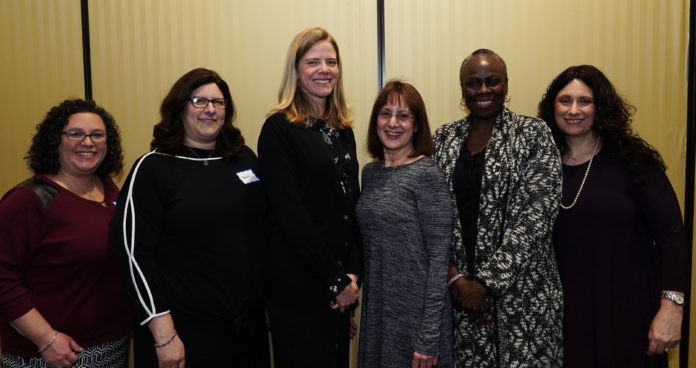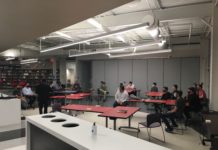Withstanding the snowy bluster of Chicago’s winter, women of all ages gathered on Feb. 17 to learn about a topic that impacts so many: women’s cancers. Acclaimed panelists addressed screenings and prevention; risk reduction; treatment options and new therapies; impact on those dealing with illness and their families; and how to best offer support—and provided clarity about the why, when, where and how of genetic testing: why it can be helpful; when it should be considered to best safeguard our health; respecting personal choices.
Keynote speaker was oncologist Funmi Olopade, MD, FACP, director of the Center for Clinical Cancer Genetics and the Palmer Distinguished Service Professor of Medicine and Human Genetics at the University of Chicago Medical Center. Dr Olopade is internationally renowned for her seminal work in cancer genomics and clinical expertise in breast cancer; she has won numerous honors including the MacArthur “genius” grant.
With clarity and warmth, she provided the audience of 80 women with overview and specifics on women’s cancers (breast, ovarian and other types), elucidating risk reduction strategies and new treatment options. She explained how breast cancer is not one disease and that DNA mutations that lead to cancer—also make cancer cells susceptible to the effects of molecularly targeted drugs. She stressed the importance of regular screenings like MRIs for women with family history.
Taya Fallen, MS, LCGC, lead genetic counselor at Insight Medical Genetics and core faculty member of the Graduate Program of Genetic Counseling at Northwestern’s Feinberg School of Medicine lectures regularly on cancer genetics. She engagingly addressed the complex topic of genetic testing, what we know about BRCA-1 and BRCA-2 mutations, and how genetic testing can be valuable in risk assessment and prevention.
Michelle Wasserman, PhD, licensed clinical psychologist at Wellsprings Health Associates, specializes in areas affecting women’s health, including coping with cancer. She provided sensitive and insightful guidance into emotional stresses that may accompany making choices in genetic testing and addressed the isolating aspects of cancer as well as other emotional challenges when you or a loved one is affected by cancer.
Mara Tesler-Stein, PsyD, a licensed clinical psychologist in private practice who specializes in grief and trauma, continued her invaluable role as moderator for the Life, Unexpected series. In her introduction she shared the story of an anonymous Chicago resident who as a child grew up in the shadow of cancer, knowing loved ones were dealing with this serious illness, and never having her fear abated by honest, open conversation with family members.
For the second half of the presentation, skillfully moderated by Mara, the professional panelists were joined by 2 community members, who with breathtaking honesty and poignancy relayed their journey in dealing with cancer diagnosis and treatment, and Chasdei Hashem, subsequent recovery.
Iris Bass created Girl Speak Up, a program for girls in Jewish day schools, and is an active volunteer with Sharsheret, supporting women dealing with cancer. She candidly addressed her experiences and difficulties, both before and after being diagnosed with breast cancer, and the role of genetic testing in providing guidance (she learned she was a carrier of the BRCA-1 mutation) regarding health decisions and prophylactic surgery.
Shuli Popel, a labor and delivery nurse at Lutheran, was equally frank about her diagnosis of ovarian cancer and the trauma of the treatments on her family life. Audience members were brought to tears when Shuli relayed what it was like to tell her young children about the diagnosis and expressed the hope that her openness and positive attitude taught her children “how to deal with challenges and stand strong in emunah.”
The strength that Iris and Shuli exemplify—both in how they courageously handled illness and difficult treatments, and their willingness to share their experiences to empower us—was nothing short of awe-inspiring.
For the past 4 years, Life, Unexpected has been a joint project of Daughters of Israel and Refuah-311 of Chicago Center; Norton & Elaine Sarnoff Center for Jewish Genetics joined the partnership for this year’s presentation. The event was chaired respectively by Rivki Pisem, Shira Winner, Goldie Kacev and Sarah Goldberg (Assistant Director of the Sarnoff Center). The warm, inviting atmosphere providing a calming ambiance to a challenging topic, décor graciously provided by TableTop Simchas.
The booklet provided to participants included moving narratives of 4 Jewish women coping with cancer and valuable suggestions about how to best provide practical and emotional support. It may be accessed by emailing [email protected]. The link for women to peruse the presentation will be IYH made available in coming weeks, through the same email.
| Participant Jami Emelfarb declared “This was an outstanding presentation, in every way. The entire event was so well organized. The speakers were excellent and incredibly knowledgeable, conveying information we need to know clearly and eloquently. I’m pretty educated about health issues and I learned so much. And the heartfelt personal stories were impactful and extremely moving.”
|
DID YOU KNOW?
- Mammograms should begin at age 40 for the general population.
- If there is a family history of breast cancer, speak to your doctor at age 25 about screening.
- Men can be carriers of the BRCA mutation. (Prostate cancer may be aggressive when linked to BRCA mutation.)
- If there is a family history of ovarian cancer and/or you have a known genetic mutation, speak to your doctor at age 30-35 about screening.
- All cancer is genetic. Not all cancer is hereditary.
- Only 5-10% of cancers is due to an inherited mutation.







